Oct. 24, 2016
By Randy Fiedler
Beginning in fall 2017, Baylor University’s College of Arts & Sciences will be adding a new interdisciplinary degree plan –– the Science Research Fellows (SRF) major –– which will allow students to earn a bachelor of science degree with increased opportunities for research. The major is expected to attract high achieving students interested in scientific research in the areas of biology, chemistry, biochemistry, psychology, neuroscience, environmental science, anthropology, geosciences and physics.
“The Science Research Fellows major adds a unique opportunity to our curriculum,” said Dr. Frank Mathis, associate dean for undergraduate studies, sciences, in the College of Arts & Sciences. “Among the flexible interdisciplinary majors now offered at Baylor, the distinctive feature of SRF is an intensive involvement in scientific research at the undergraduate level. The program is not for everyone, but it’s a perfect fit for students who are serious about a career that involves scientific research.”
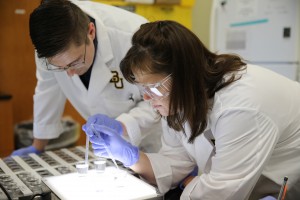 The Science Research Fellows major will provide a research-rich curriculum that prepares students for the rigors of research in multiple aspects of scientific inquiry. Students will be placed in research labs by the fall of their sophomore year, where they will continue to conduct research until they finish their degree. The program will accept approximately 10 new students each year, and will foster a mutually beneficial mentor relationship between students and Arts & Sciences faculty.
The Science Research Fellows major will provide a research-rich curriculum that prepares students for the rigors of research in multiple aspects of scientific inquiry. Students will be placed in research labs by the fall of their sophomore year, where they will continue to conduct research until they finish their degree. The program will accept approximately 10 new students each year, and will foster a mutually beneficial mentor relationship between students and Arts & Sciences faculty.
“Undergraduate research is an important engaged learning experience that is preparing our students for lifelong careers,” said Dr. Lee C. Nordt, dean of the College of Arts & Sciences. “Science Research Fellows is a valuable tool that will help us recruit and retain outstanding students who have a passion for research. That desire will be honed during their time in the program as they work closely with faculty mentors in their chosen fields of study.”
 Dr. Rizalia M. Klausmeyer, associate director of the Office of Prehealth Studies and a part-time lecturer in chemistry and biochemistry, is the founding director of the Science Research Fellows program. She said she’s looking forward to helping research-minded students flourish at Baylor.
Dr. Rizalia M. Klausmeyer, associate director of the Office of Prehealth Studies and a part-time lecturer in chemistry and biochemistry, is the founding director of the Science Research Fellows program. She said she’s looking forward to helping research-minded students flourish at Baylor.
“We’re going to mentor them and guide them through the complexities of scientific research because we want them to succeed. We’re also going to prepare them to make successful applications to top-tier graduate and professional programs,” Klausmeyer said.
During their freshman year, SRF majors will be required to take a class on research methods covering a range of scientific disciplines.
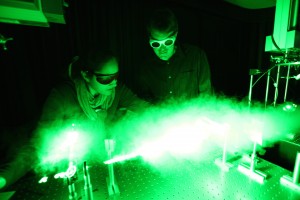 “The class will allow students to see how research is done across different disciplines,” Klausmeyer said. “After completing the class, students will declare a main track within the major. Depending on what that chosen concentration is –– whether it’s chemistry or psychology or another field of study –– we will arrange interviews with professors in that field so that students can find a faculty member to do research with. The students will then begin that research by the start of their sophomore year.”
“The class will allow students to see how research is done across different disciplines,” Klausmeyer said. “After completing the class, students will declare a main track within the major. Depending on what that chosen concentration is –– whether it’s chemistry or psychology or another field of study –– we will arrange interviews with professors in that field so that students can find a faculty member to do research with. The students will then begin that research by the start of their sophomore year.”
Klausmeyer said SRF students don’t necessarily need to have an area of specialization in mind when they apply for the program.
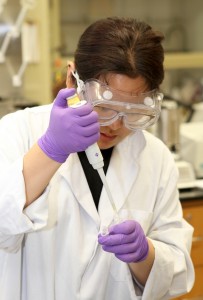 “We welcome students who know they like science and want to have a career in it, but are maybe not yet sure about what kind of science is the best match for their interests and abilities,” she said. “But all SRF students should be planning to do some sort of postgraduate study, in most cases resulting in a PhD or a combination of the PhD and MD degrees.”
“We welcome students who know they like science and want to have a career in it, but are maybe not yet sure about what kind of science is the best match for their interests and abilities,” she said. “But all SRF students should be planning to do some sort of postgraduate study, in most cases resulting in a PhD or a combination of the PhD and MD degrees.”
Students applying for the Science Research Fellows program must have SAT scores of 1,400 or above (critical reading and math) and/or ACT scores of 32 or above. They must complete an application, answer a questionnaire and provide two letters of recommendation from high school teachers, at least one of whom must be a science teacher. Applications for the inaugural group of Fellows are being accepted during the 2016-2017 academic year.
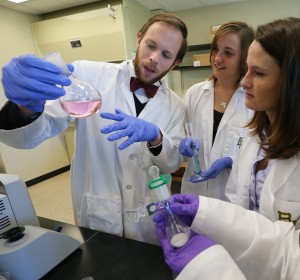 Science Research Fellows will be required to demonstrate satisfactory progress to maintain their status in the program. Satisfactory progress is defined as maintaining an overall 3.5 GPA, performing satisfactorily in their research, demonstrating honor and integrity and earning grades of B or better in each science course taken. Students who fall below the 3.5 GPA minimum will be given one semester to raise their GPA to the required level before being dismissed from the program.
Science Research Fellows will be required to demonstrate satisfactory progress to maintain their status in the program. Satisfactory progress is defined as maintaining an overall 3.5 GPA, performing satisfactorily in their research, demonstrating honor and integrity and earning grades of B or better in each science course taken. Students who fall below the 3.5 GPA minimum will be given one semester to raise their GPA to the required level before being dismissed from the program.
To graduate with a BS degree in Science Research Fellows, students must complete a minimum of 124 hours of coursework, including a minimum of 16 hours of SRF credits and 36 hours of 3000/4000 level credits. Requirements include six hours of religion courses, two semesters of Chapel and 21 hours of upper-division science courses.
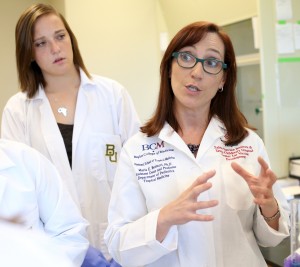 Applications for the Science Fellows Program will be accepted beginning Nov. 1, 2016. All applicants must first be accepted to Baylor University’s Fall 2017 freshman class before applying. Students can apply online through their goBAYLOR account, or through the Science Fellows website (www.baylor.edu/srf). Questions about the application process or other aspects of the SRF program can be submitted at Science_Fellows@baylor.edu.
Applications for the Science Fellows Program will be accepted beginning Nov. 1, 2016. All applicants must first be accepted to Baylor University’s Fall 2017 freshman class before applying. Students can apply online through their goBAYLOR account, or through the Science Fellows website (www.baylor.edu/srf). Questions about the application process or other aspects of the SRF program can be submitted at Science_Fellows@baylor.edu.

Education is very useful and what is the name of this article?